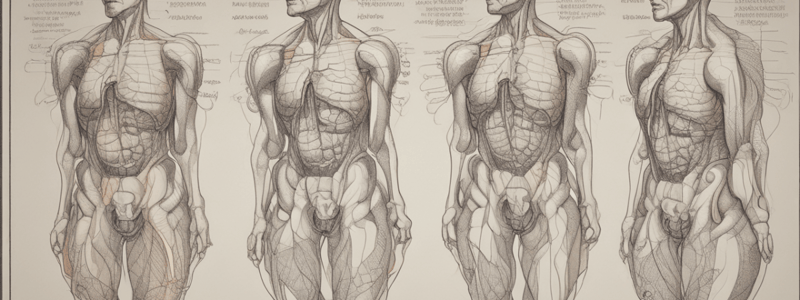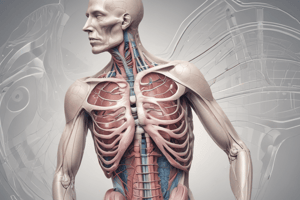Podcast
Questions and Answers
What is a hernia defined as?
What is a hernia defined as?
- A lump in your tummy or groin
- A medical problem that increases pressure on the abdominal wall
- An internal part of the body pushing through a weakness in the muscle or surrounding tissue wall (correct)
- A weakness in the muscle or surrounding tissue wall
Where do hernias usually develop?
Where do hernias usually develop?
- Between the chest and hips (correct)
- In the arms or legs
- In the back or spine
- In the head or neck
What can make a hernia lump appear?
What can make a hernia lump appear?
- Eating or drinking
- Lying down
- Sleeping or resting
- Coughing or straining (correct)
What is a common symptom of an inguinal hernia?
What is a common symptom of an inguinal hernia?
What type of hernia occurs through the natural weakness in the internal inguinal ring?
What type of hernia occurs through the natural weakness in the internal inguinal ring?
Which group of people is more likely to develop a direct inguinal hernia?
Which group of people is more likely to develop a direct inguinal hernia?
What can improve the pain of an inguinal hernia?
What can improve the pain of an inguinal hernia?
What is a common cause of increased pressure on the abdominal wall that can lead to a hernia?
What is a common cause of increased pressure on the abdominal wall that can lead to a hernia?
What is a common symptom of a sportsman hernia?
What is a common symptom of a sportsman hernia?
What is the recommended approach for treating a sportsman hernia?
What is the recommended approach for treating a sportsman hernia?
Where do femoral hernias typically appear?
Where do femoral hernias typically appear?
What is a common complication of femoral hernias?
What is a common complication of femoral hernias?
What is an incisional hernia?
What is an incisional hernia?
What is a common cause of umbilical hernias in adults?
What is a common cause of umbilical hernias in adults?
What is the typical outcome of umbilical hernias in infants?
What is the typical outcome of umbilical hernias in infants?
Which type of hernia is more common in men?
Which type of hernia is more common in men?
What is the usual course of action for a hernia without symptoms?
What is the usual course of action for a hernia without symptoms?
What is the main goal of physiotherapy in hernia treatment?
What is the main goal of physiotherapy in hernia treatment?
What is the standard surgical technique for most abdominal wall hernias?
What is the standard surgical technique for most abdominal wall hernias?
What is the aim of rehabilitation exercises after hernia surgery?
What is the aim of rehabilitation exercises after hernia surgery?
What may be ordered to determine if a bowel obstruction is present?
What may be ordered to determine if a bowel obstruction is present?
What may be used to see a femoral hernia?
What may be used to see a femoral hernia?
What is the location of the weakness or gap in Spigelian Hernias?
What is the location of the weakness or gap in Spigelian Hernias?
What is a common cause of Spigelian Hernias?
What is a common cause of Spigelian Hernias?
What is the characteristic of Hiatal Hernias that distinguishes them from other types of hernias?
What is the characteristic of Hiatal Hernias that distinguishes them from other types of hernias?
What is a complication of hernias that can lead to heartburn and erosion of the esophagus?
What is a complication of hernias that can lead to heartburn and erosion of the esophagus?
What is the second leading cause of small bowel obstruction?
What is the second leading cause of small bowel obstruction?
What is the diagnosis of an irreducible hernia?
What is the diagnosis of an irreducible hernia?
How are hernias often diagnosed?
How are hernias often diagnosed?
What can be visible when standing upright in some cases of hernias?
What can be visible when standing upright in some cases of hernias?
Flashcards are hidden until you start studying
Study Notes
Definition and Causes of Hernia
- A hernia occurs when an internal part of the body pushes through a weakness in the muscle or surrounding tissue wall.
- Hernias usually develop between the chest and hips.
- Activities and medical problems that increase pressure on the abdominal wall can lead to a hernia, including:
- Straining on the toilet
- Persistent cough
- Cystic fibrosis
- Enlarged prostate
- Straining to urinate
- Being overweight or obese
- Abdominal fluid
- Lifting heavy items
- Peritoneal dialysis
- Poor nutrition
- Smoking
- Physical exertion
- Undescended testicles
Types of Hernia
- Inguinal Hernias: located in the lower abdomen, can occur on both sides of the pubic area, classified as direct or indirect.
- Sportsman Hernia: a condition of chronic exercise-related supra-inguinal groin pain, often without visible swelling.
- Femoral Hernias: occur just below the groin crease, more common in women, can lead to incarceration or strangulation.
- Incisional Hernias: appear at the site of a previous surgery, can vary in size, and may develop weeks, months, or years after surgery.
- Umbilical Hernias: occur near the bellybutton, may occur in infants, but can persist throughout life.
- Epigastric Hernias: occur due to a weakness in the muscles or tendons of the upper abdominal wall, more common in men.
- Spigelian Hernias: a rare type of hernia that occurs between the muscles of the abdominal wall, often on the right-hand side of the abdomen.
- Hiatal Hernias: occur in the diaphragm, can cause reflux of acid from the stomach into the oesophagus, leading to heartburn and pain.
Symptoms of Hernia
- Small bulge in the groin or abdomen
- Swollen scrotum
- Weakness, heaviness, or pain in the groin
- Burning or pinching sensation in the groin
- Pain that improves with rest and worsens with lifting, coughing, or straining
Complications of Hernia
- Bowel Obstruction: can lead to small bowel obstruction
- Incarceration: an irreducible hernia that cannot be pushed back manually
- Strangulation: caused by a compromised blood supply
Diagnosis and Treatment of Hernia
- Diagnosed through physical exam, sometimes with ultrasound or abdominal X-rays
- Treatment may involve watching and waiting, but surgical repair is often necessary
- Surgical procedures include open or laparoscopic suture repair, and the use of mesh
- Physiotherapy can help reduce symptoms and risk of hernia by reducing pressure, strengthening supporting tissue, and applying compression support
- Rehabilitation period after hernia surgery involves gentle stretching exercises to strengthen core muscles
Studying That Suits You
Use AI to generate personalized quizzes and flashcards to suit your learning preferences.




